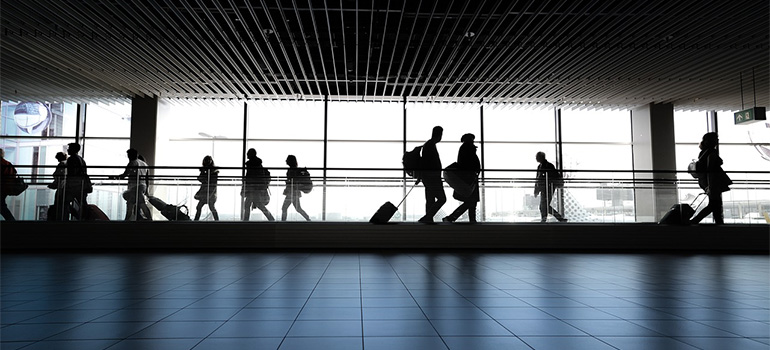What Are the Common Issues With Global Moves
Moving across borders presents challenges that go beyond a local move. The process requires thorough planning and professional support, from customs paperwork to unpredictable shipping delays. Those relocating for work, education, or personal reasons often underestimate the complexity of moving household goods, adjusting to a new culture, and managing legal requirements. Knowing what to expect can help avoid common issues with global moves, costly mistakes, and unnecessary stress. Thus, our Hansen Bros. Moving & Storage guide will help you move smoothly and stay in control!
Navigating Customs and Paperwork
International shipping involves more than packing belongings and arranging transportation. Customs regulations vary by country, and failing to meet requirements can result in delays, fines, or confiscated items. Many movers struggle with documentation errors, especially when unfamiliar with import restrictions.
Each country has its own list of prohibited and restricted items, which can include everyday household goods, electronics, or even food products. Something as simple as a missing signature or an incomplete inventory list can lead to customs holding a shipment indefinitely.
To prevent these issues, preparing documents in advance is essential. Most international moves require:
- A detailed inventory of shipped items.
- Proof of identity and residency, such as a passport or visa.
- Customs declaration forms specific to the destination country.
- Additional paperwork for vehicles, pets, or high-value items.
Professional international movers Seattle offers have experience in international relocations and can guide you through this process. Experts can ensure documents are completed correctly and help navigate customs laws to prevent unnecessary delays.

Managing Shipping Costs and Avoiding Unexpected Fees
The cost of an international move depends on multiple factors, including distance, shipment size, and transportation mode. Many clients assume the initial moving estimate covers everything, only to encounter unexpected fees later. These can include port charges, storage costs due to customs delays, and additional handling fees for large or fragile items.
Understanding pricing structures is key to budgeting properly:
- Air freight offers speed but is significantly more expensive than ocean freight.
- Shipping by sea is cost-effective for larger loads, but transit times are longer, sometimes taking several weeks or months.
- Consolidated shipping—where multiple clients share a container—can reduce costs but requires flexible delivery timelines.
Clients should ask their moving services Seattle provider for a clear breakdown of costs, including potential surcharges. Requesting an all-inclusive quote that covers customs clearance, delivery, and storage can prevent financial surprises.
Protecting Belongings From Damage or Loss
Transporting household goods across continents exposes them to multiple handling points, increasing the risk of damage or loss. Items pass through warehouses, customs inspections, and various transit methods before reaching their final destination. The most common issues with global moves like poor packing techniques, weak containers, or improper labeling can lead to broken, misplaced, or missing items.
Investing in professional packing services ensures belongings are secure. Sturdy, weather-resistant materials help protect shipments from humidity, temperature changes, and rough handling. Custom crating is often necessary for fragile or high-value items such as artwork, electronics, and antique furniture.
Inventory tracking is another safeguard. Labeling all boxes with detailed descriptions and keeping a digital inventory can help identify missing items quickly. Additionally, international moving insurance provides financial protection in case of accidental damage or loss. Choosing coverage based on shipment value ensures adequate reimbursement if an issue arises.
Dealing With Delays in Shipping and Delivery
Even the most well-planned international move can face delays. Unpredictable factors such as customs backlogs, port congestion, and extreme weather conditions can disrupt shipping schedules. In some cases, a delay of just a few days can result in additional storage fees if the destination is not ready to receive the shipment.
Advance planning can minimize these risks. Working with reliable international commercial shipping companies that offer shipment tracking provides peace of mind. Also, many international movers offer estimated arrival windows rather than fixed dates, allowing flexibility for unexpected delays. Keeping essential items—such as important documents, medications, and a few days’ worth of clothing—in personal luggage prevents inconvenience while waiting for belongings to arrive.

Adjusting to Healthcare and Insurance Requirements
Healthcare systems vary widely from country to country, and understanding how to access medical services in your new home is crucial. Some countries provide public healthcare for residents, while others require private insurance. Without proper coverage, you may face high out-of-pocket costs for medical care.
Before you move, check whether you need to purchase international health insurance or if you qualify for the local healthcare system. If your employer provides coverage, review the details to understand what’s included.
Also, make sure you know how to find a doctor, where the nearest hospital is, and what to do in case of an emergency. If you take prescription medications, research whether they’re available in your destination and what documentation you need to bring them with you.
Handling Housing and Temporary Accommodation
Finding a place to live before your move is one of the biggest challenges you’ll face. Some countries have strict rental requirements, while others have competitive housing markets that make securing a home difficult. If you don’t arrange housing in advance, you could find yourself in an expensive hotel or temporary rental for longer than expected.
To avoid this, research rental options early. If you can, visit the area before shipping your items with one of the trustworthy shipping companies Seattle offers. The idea is to explore neighborhoods and check available properties.
Many landlords require local references or proof of employment, so be prepared with all necessary documents. If you’re relocating for work, ask your employer about corporate housing options. Short-term rentals are another great solution while you settle in and look for a permanent home.
Overcoming Language Barriers and Cultural Differences
If you’re moving to a country where you don’t speak the language fluently, daily tasks can quickly become frustrating. Ordering food, asking for directions, or setting up utilities might not be as simple as you expect. Even in countries where English is widely spoken, cultural differences can create misunderstandings.
Start learning basic phrases before you arrive. A language app or online course can help with everyday conversations. Many expat communities also offer language exchange programs where you can practice speaking with locals.
Beyond the language itself, understanding cultural norms can help you adjust faster. Small things—like how people greet each other, tipping customs, or public transportation etiquette—can make a big difference in feeling comfortable in your new environment.

Sorting Out Visas and Work Permits
One of the most common issues with global moves and stressful parts of moving abroad is dealing with visas and work permits. Every country has different rules, and missing a step in the application process can delay your ability to start working or even enter the country. Some visas require sponsorship from an employer, while others have strict financial or residency requirements.
Start the process early. Research the specific visa type you need and make sure you meet all requirements. If you’re moving for work, stay in close contact with your employer’s HR team to ensure paperwork is completed correctly and the best office movers Seattle has are on the job. If you’re handling the process yourself, consulting an immigration expert can help you avoid delays.
Even after arriving, there may be additional steps—such as registering with local authorities or applying for a residency card. Keep track of deadlines to ensure your documents remain valid, and always carry copies of important paperwork in case you need them.
Keeping Track of International Banking and Finances
Managing your finances in a new country can be complicated. You may need to open a local bank account, transfer money between countries, and deal with foreign currency exchange rates. Some banks require proof of residence before you can open an account, which can create a frustrating cycle if you need a local bank to secure housing or receive a salary.
To avoid financial headaches, research banking options in advance. Some international banks allow you to open an account before you arrive, making it easier to access funds immediately. Consider using online banking and digital payment apps to manage transactions across different currencies. If you’ll be making regular international transfers, look for services with low fees to avoid unnecessary charges.
Handling Pets and Their International Travel Requirements
If you’re moving with pets, planning their relocation requires just as much attention as your own. Different countries have strict regulations regarding pet entry, and missing a requirement can result in quarantine, additional fees, or even refusal of entry.
Some destinations require pets to have specific vaccinations, microchips, or health certificates issued by a licensed veterinarian. Others enforce quarantine periods, which can range from a few days to several weeks. Air travel also presents challenges, as not all airlines allow pets in the cabin, and cargo conditions vary.
To make the process easier and avoid these common issues with global moves, follow these key steps:
- Check import regulations early – Some countries require months of preparation for pet entry.
- Schedule vet visits – Ensure vaccinations, health certificates, and microchips meet destination requirements.
- Choose an airline with pet-friendly policies – Not all carriers accommodate pets, especially on long-haul flights.
- Prepare a secure pet carrier – Choose an airline-approved, well-ventilated crate to keep your pet comfortable.
- Consider quarantine rules – Some destinations require pets to be quarantined before or after arrival.
- Update pet identification – Ensure your pet’s microchip details match your new address.
- Hire a pet relocation service – Professional pet movers can handle logistics, customs, and documentation.
Taking these steps will help ensure a safe, smooth transition for your pet, reducing stress for both of you during the move!
Coordinating School Enrollment for Children
If you’re relocating with school-aged children, enrolling them in a new school system can be overwhelming. Different countries have varying academic calendars, grading systems, and admission policies. Some schools require entrance exams or language proficiency tests, while others may have waitlists for international students.
Start researching schools as soon as possible. Decide whether you want your child to attend a public, private, or international school, as each has different application processes and costs. Contact schools directly to understand admission requirements and whether they offer support for non-native speakers.
If your move happens mid-year, discuss with the school how to help your child transition academically and socially. Keeping digital copies of transcripts, recommendation letters, and previous coursework can speed up the enrollment process. A well-planned school transition can make settling into a new country much easier for both you and your child.

Dealing With Emotional and Social Adjustments
Moving to a new country isn’t just about logistics—it’s also a big emotional adjustment, which places it amid common issues with global moves. You might feel homesick, especially if you’re leaving family and friends behind. Daily routines will change, and it may take time to build a new social circle. If you’re moving with a family, everyone will experience the transition differently, and helping children adjust to a new school and environment can add to the stress.
Give yourself time to settle in. Join local groups, attend community events, or connect with other expats who understand what you’re going through. Many cities have online forums or social media groups where you can meet people in similar situations. Staying in touch with loved ones back home through regular calls and messages can also help ease the transition.
Are You Ready for the Challenges of an International Move?
Moving across borders brings excitement but also plenty of challenges. What happens if your shipment gets delayed? Having a backup plan and essentials in your carry-on can help you manage unexpected wait times.
How do you handle customs and paperwork without delays? Preparing documents early and working with professionals familiar with your destination’s regulations can prevent hold-ups. What about settling in once you arrive? Understanding cultural differences, securing housing in advance, and making local connections will help you adapt faster.
International relocations aren’t simple, but knowing the common issues with global moves and how to navigate them can make the process easier. With careful planning, the right resources, and a flexible mindset, you can turn a complicated move into a successful new beginning!
Why Choose Us
History
Hansen Bros. Moving & Storage is locally owned and operated by the same family for four generations, since 1890. We have a well-established reputation for service quality and reliability with a high percentage of repeat household and commercial clients.
Professionalism
We’re a certified ProMover by the American Moving and Storage Association with A+ rating with the Better Business Bureau, voted “Best in Western Washington” in 2009 and from 2011 to 2016 by KING5. Our company is fully licensed and insured and member of WMC and AMSA.
Value
Hansen Bros. Moving & Storage provide free, no-obligation in-home estimate and competitive rates, including low minimum rates for shipments moving under 300 miles. We’ve set a refund policy for unused packing materials and three Puget Sound locations to help clients save on travel fee costs.



